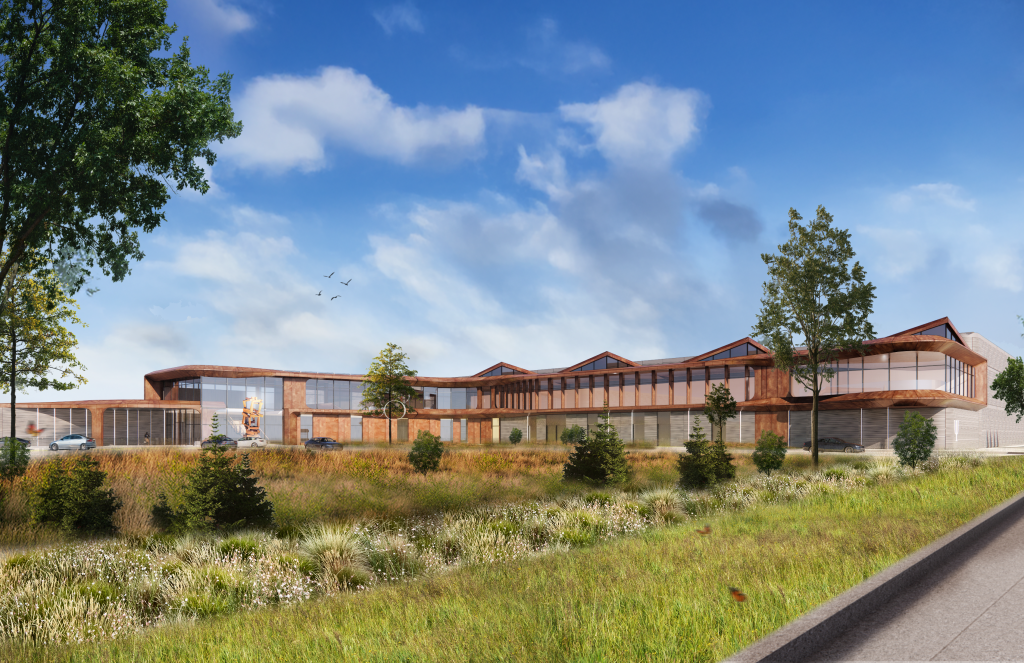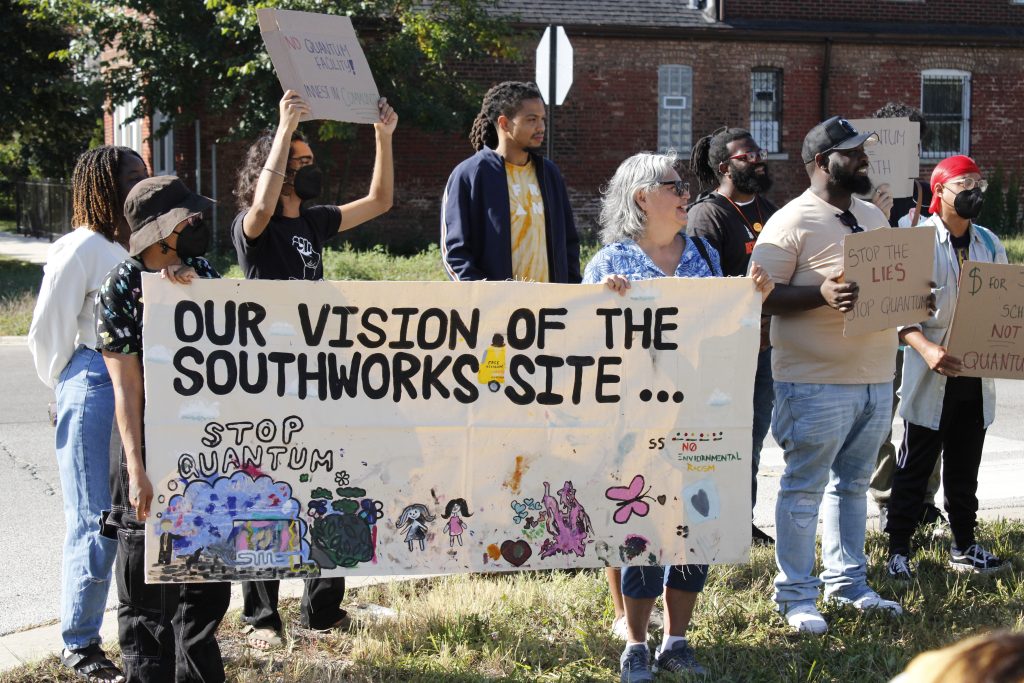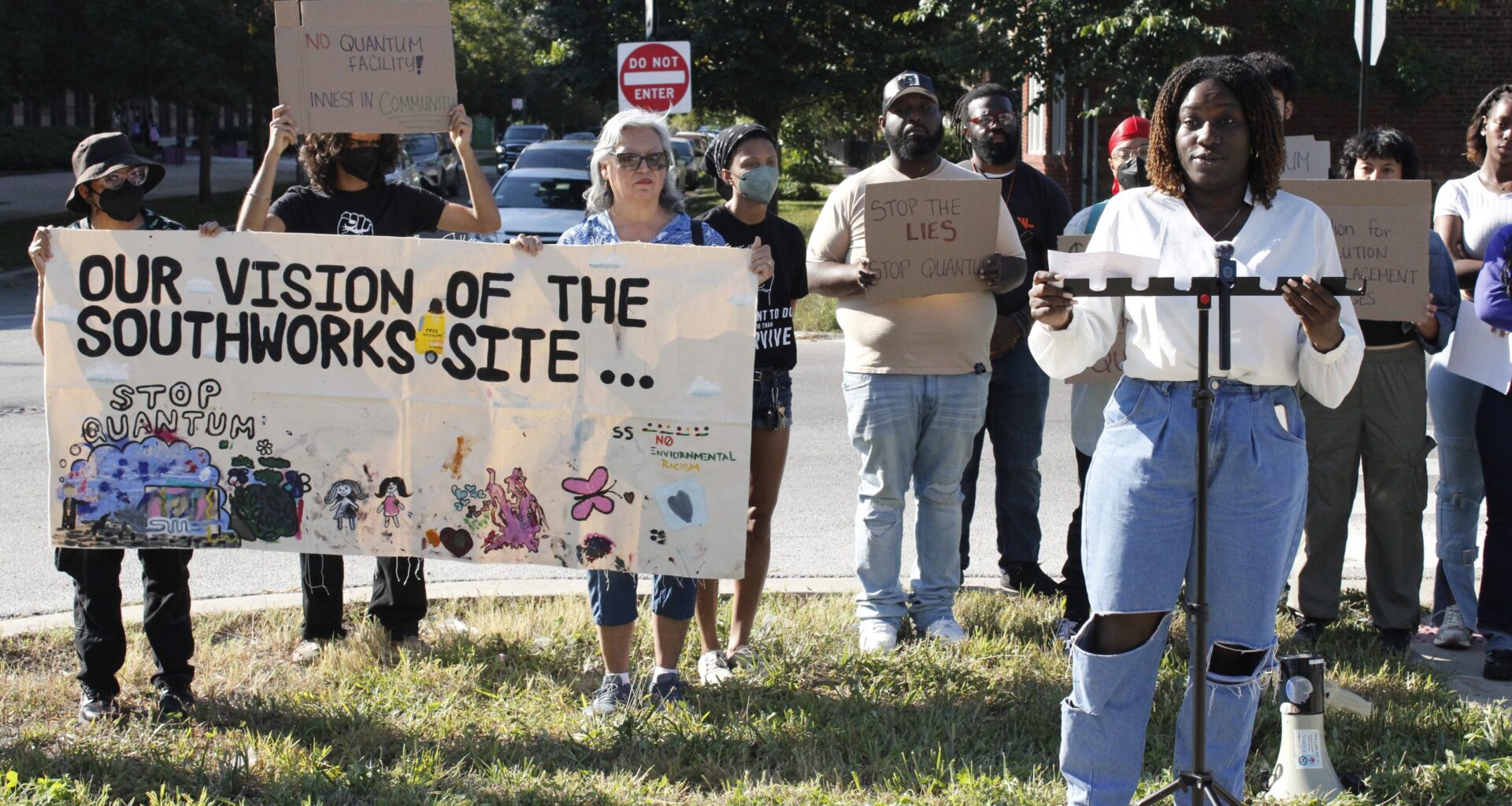SOUTH CHICAGO — A group of activists and neighbors are speaking out against plans for a massive quantum computing development on the South Side, calling for the hundreds of millions in public financing slated for that development to instead be spent on resources for existing residents.
Development firm Related Midwest is leading a project to build a 128-acre campus for quantum computing research as part of the larger Quantum Shore Chicago development on the former U.S. Steel South Works site.
Private companies including PsiQuantum, IBM and Infleqtion — as well as the federal Defense Advanced Research Projects Agency and numerous Illinois universities — have announced their involvement in the project, where they’ll test whether quantum computing is more than “hype” and race to develop the world’s first quantum computer for practical use.
Some South Siders “unequivocally” oppose the quantum park’s construction, and want to see the billions of dollars slated for the project instead go toward developments chosen by existing residents, they said at a rally and press conference Tuesday.
“Funding should be used to create an ecosystem where residents can thrive in clean air, have access to public health resources and enhance the greenery of South Chicago’s land through urban planning investments,” said Dawn Johnson, a South Shore resident and member of Southside Together, which is leading the campaign.
Infrastructure and transportation investments, culinary programs and job training for youth, and the development of sites for environmental preservation are among the ways public money should be spent instead, Johnson said.
Attendees of Tuesday’s rally said neighbors need improved access to food and groceries, and they’re suffering from a rash of pharmacy closures in the area — problems which local leaders should prioritize, they said.
They called on local leaders to cancel the project, citing concerns about a “lack of transparency,” the U.S. defense sector’s interest and role in the quantum computing industry and the impacts of the campus on the local environment and utilities.
“As Southside Together, we unequivocally oppose this facility,” Calumet Heights resident Yaa Angie Orokoh said. “The quantum facility is not the investment we need in this community, period. We demand a transparent and democratic process on what happens in our communities.”
The quantum campus is estimated to cost $9 billion, local leaders said last year. It’s set to receive $500 million in state funding and an estimated $175 million over 30 years in county tax breaks. Mayor Brandon Johnson has pledged $5 million to the project from the city’s housing and economic development bond program.
The developers have not yet purchased the land, Related Midwest spokesperson Tricia Van Horn said. She did not give an estimated date for the project’s groundbreaking, which was slated to take place as early as February 2025, developers said during the city’s approval process last year.
The first phase of construction at the quantum park will focus on PsiQuantum’s facilities, Van Horn said.
 A rendering of the quantum computing research and development campus planned for the former U.S. Steel South Works site in South Chicago. Credit: Related Midwest
A rendering of the quantum computing research and development campus planned for the former U.S. Steel South Works site in South Chicago. Credit: Related Midwest
Southside Together is one of the key groups in the push for community benefits to residents near the Obama Presidential Center site in Jackson Park. Prior to launching their campaign against the quantum campus, group members voiced concerns about the project during the Obama CBA Coalition’s June housing summit, according to the TRiiBE.
Opponents of the quantum campus likened the project to the xAI data center in Memphis, which faces a legal challenge from the NAACP over its environmental impacts. Johnson did not say whether neighbors plan to sue the city, state or developers in an attempt to block the project.
Unlike the xAI data center — which has been powered by unpermitted gas turbines, according to Time Magazine — PsiQuantum has pledged to “use 100 percent carbon-free electricity to power its facility.” However, officials have not given specifics on how they will do so.
The wider quantum campus is estimated to require 350 megawatts of power, according to ComEd.
Harley Johnson, executive director of the quantum campus, told Inside Climate News in March he expects to find a power solution that doesn’t directly raise residents’ bills, but specifics on that solution are “really a question for ComEd,” he said.
The energy cost of the quantum campus “is largely contained to the ComEd rate class made up of other similarly sized large customers, not including residential customers,” spokesperson Brendan Recka said Wednesday.
Beyond the quantum campus, the Quantum Shore development includes Advocate Health’s plan to replace the 205-bed Trinity Hospital with a 52-bed hospital near Brandon Avenue and DuSable Lake Shore Drive. A state review board approved the hospital plans in June.
Site developers and local leaders have also said Steelworkers Park and Park No. 566 would remain open to the public. The project would improve park access by connecting DuSable Lake Shore Drive to the existing parks along the former steel mill’s North Slip near 85th Street, and will include the creation of a 1.65-mile recreational trail along the Calumet River and South Slip near 89th Street, Van Horn said.
Organizers are not opposed to the hospital — though they take issue with referring to Trinity’s replacement as a new hospital, they said. They also don’t trust nearby parks will remain accessible with a federal defense agency nearby, they said Tuesday.
 Members of the activist group Southside Together and other opponents to the proposed quantum campus on the former U.S. Steel South Works site rally on the corner of 83rd Street and Mackinaw Avenue Tuesday morning, calling for local leaders to pull their support from the project. Credit: Maxwell Evans/Block Club Chicago
Members of the activist group Southside Together and other opponents to the proposed quantum campus on the former U.S. Steel South Works site rally on the corner of 83rd Street and Mackinaw Avenue Tuesday morning, calling for local leaders to pull their support from the project. Credit: Maxwell Evans/Block Club Chicago
The planned quantum campus has proven divisive among South Siders, though few residents and organizations had publicly and unequivocally denounced the plans before this week’s rally.
South Siders in support of the project have praised its potential to revive the neighborhood’s economy, which has stagnated since South Works and other nearby steel mills closed.
Small business owners, educators, parents and block club leaders have shown “genuine excitement” about the campus at “dozens of events” around the project, Shaunna Sims-Davis, a community advisor to the quantum campus, said in a statement.
“We could not have chosen a better community or set of partners in this work, and we are just getting started,” Sims-Davis said.
Skeptics have acknowledged the potential economic boost while urging officials not to rush and throw money at an unproven industry, which seeks to develop on land with a history of environmental contamination.
The campaign against the development is separate from a push by the Coalition for a South Works CBA to secure a contract guaranteeing specific community benefits for residents of South Chicago and nearby neighborhoods.
Supporters of a community benefits agreement announced their demands around jobs, environmental protection and anti-displacement measures last week.
Quantum Shore is the latest proposal for the South Works brownfield, following failed pitches for a movie studio campus, a 20,000-home neighborhood and the mixed-use Chicago Lakeside development, among other ideas.
Listen to the Block Club Chicago podcast:

